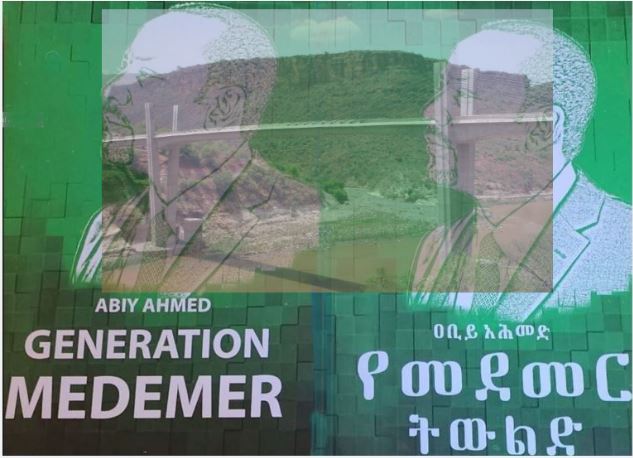The art of denial (lying)
Special Commentary
The art of denial (lying)
[Originally appeared in Ethiomedia.]
http://www.ethiomedia.com/all/6096.html
Ethiomedia | June 16, 2008
________________________________________
Credit must be given where it’s due. And Meles Zenawi and his crew deserve full credit. For perfecting the art of denial (lying) just like the smooth career criminals who deny everything when caught: “Didn’t do it! Wasn’t there! Didn’t happen! Somebody else did it. Someone stole my fingerprints to make it look like I done it!” Deny, deny, deny!
Famine? What famine? That’s the response of Meles and his gang about the famine that is slowly enveloping Ethiopia, and swallowing its people region by region. A few days ago, the reptilian “Deputy Prime Minister” Addisu Legesse groused: “Institutions that exaggerate the food shortage in Ethiopia and report inflated figures of the needy are intent on belittling the economic growth of the country and calculating their interests.” According to Meles, Inc. Ministry of Disinformation, the whole famine thing is a figment of the overactive imagination of the foreign media and humanitarian organizations: “It is ridiculous and unethical that some media outlets are reporting as if food grain price hike is typical of Ethiopia, though it is known that the existing global price hike is a result of soaring price of oil and ever-increasing demand of food grain among the developing countries. The reporting of some media is very much exaggerated and far from the truth,” concluded the garbled statement of the Disinformation Ministry.
The bottom line from Meles Inc. is: There is no famine in Ethiopia. Just millions of Ethiopians who can’t afford to buy food because it is damn too expensive! But Meles runs a pretty slick disinformation campaign: Blame the international commodities markets for high food prices in Ethiopia, and demonize the foreign media and aid organizations for ruining Ethiopia’s image. Then dish out boldfaced lies to distract public attention from the raging famine, and promptly declare victory: “The country has registered during the last five consecutive years rapid double digit economic growth… ”
The fact of the matter is that people in Ethiopia are starving to death, by the thousands every day. There is no question about that: “We’re overwhelmed,” said Margaret Aguirre recently, a spokeswoman for the International Medical Corps, a California-based aid agency. “There’s not enough food and everyone’s starving and that’s all there is to it.” Georgia Shaver, the World Food Programme’s director in Ethiopia, painted an equally bleak picture saying that while up to 14 million people needed food aid across six countries in southern Africa, “in Ethiopia we could have the same number in just one country.”
Now, why would Aguirre, Shaver, the BBC, CNN, Al Jazeera… lie about famine in Ethiopia? What would they gain from “exaggerating” the famine?
Famine Facts
For over three decades, Ethiopia has been the international poster lady for famine and starvation. Images of throngs of skeletal children and their starving parents scratching the sun-baked earth are indelibly imprinted in the minds of people around the world. In 1974, mutinous soldiers deposed Emperor Haile Selassie after foreign reporters (“The Unknown Famine” by Jonathan Dimbleby) and some international humanitarian organizations revealed to the world that a famine of biblical proportion was taking place in the north of the country. Just like Meles today, Haile Selassie then denied reports of widespread famine and starvation, and tried to cover it up. When news of the famine shocked the world, Haile Selassie blamed the foreign media for exaggerating the scope of the disaster and for tarnishing Ethiopia’s image.
In 1985, after a decade of disastrous experiments in socialism, Mengistu presided over a famine that claimed the lives of nearly a million people. He also blamed drought and poor rainfall for the famine (but never his disastrous socialist policies) and set out to deal with the problem by putting into place a reckless policy of forced resettlement of hundreds of thousands of people from the north to the more fertile south. Like Meles today, Mengistu then, sat with his arms crossed waiting for massive international food aid to be delivered to his door. Meles today claims the problem of famine in Ethiopia, if it existed at all, is caused by drought and poor rainfall during successive seasons (but never his disastrous economic policies that give higher priority to growing roses than teff), and now expects delivery of massive emergency food aid from Western nations to rescue Ethiopia. Like Haile Selassie who blamed the famine, the high costs of imported goods, gasoline, and skyrocketing food prices, unemployment, etc., on the international oil crises of 1973, Meles today blames the oil crises of 2008 for exactly the same things.
Meles’ Fine Art of Denial (Lying)
Meles and his gang have perfected the art of denial (lying) and raised it to new heights. They have done it by
Denial of fact: They deny undeniable facts with a straight face. Example: “Famine does not exist in Ethiopia. It is a story made up by the foreign media and aid organizations. It is all ‘exaggregated and far from the truth’.”
Denial of responsibility: They deny responsibility in the event such a thing as famine should be discovered. Example: “There is no famine, but if, in the unlikley event it exists, it is first and foremost the responsibility of God. He failed in his divine duty to send the rains. He did not. Therefore, there was no harvest, which means famine. God’s co-conspirators include the oil cartels and the greddy manipulators of global food prices. Last but not least of the culprits is the West. They also failed in their duty to supply food aid as they have dutifully done for the past three decades. We had nothing to do with it. We were just minding our own business growing roses and making sure of double digit economic growth.”
Denial of impact: There is really no famine as such in the country, just some pockets of grain deficits. Example: “With the exception of spot shortages in Oromiya and Somali regions, everything is hunky dory. There is plenty of food in the rest of the country, if people have the cash.”
Denial of awareness: We were so busy doing “double digit economic development” and tending to our rose gardens, we were not aware of any famine. Example: “It is impossible to have famine in a country that has been wallowing in ‘double digit economic growth for the past five years’. We’ve been so busy building office structures, luxury villas with swimming pools, world class hotels, exporting roses and importing French wines and champaigne, we simply did not know famine was ravaging the countryside. Oops!! Sorry!”
Denial of recurrence: If there is famine, it just happened. Example: “We did not know this famine thing is recurrent. There were no early warning signs. No sentinel events to cause us concern that real famine was going to happen. Anyway, no big deal. We are in ‘double digit economic growth’ and this famine shall be over soon like all the rest. It is just once in a decade type of thing.”
Denial of denial: There is nothing that we must do to deal with the problem of famine, if it exists. Example: “The whole famine thing will take its own course. For decades, there has been famine in Ethiopia. It’s not like this is the first time. Nothing happened in the past from famine. There are a lot more people in Ethiopia today than were in 1974 or 1984. So, famine will have no real effect on the population. It is natural. We don’t need to do anything.”
Denial-by-admission: The whole famine thing is an overblown “exaggeration”. Example: “It is true that millions of people are at risk of food shortage. But what some describe as famine in Ethiopia is nothing more than food insecurity. Those skeletal children that are seen in the international media are just nutritionally-challenged, but they are, by no means, famine victims! Their parents are victims of critical food shortages for extended periods, not famine. At worst, the food situation in Ethiopia points to large-scale chronic food deprivation, which is not the same as famine.”
Why is Ethiopia Stalked by Recurrent Famine?
When Haile Selassie was deposed over the famine, the people asked: Why didn’t he do something to prevent it? When Mengistu celebrated the tenth anniversary of his socialist government and hundreds of thousands of people died in a catastrophic famine, the people asked: Why didn’t he do something to prevent it? Now, the same question must be put to Meles: Why didn’t he do something to prevent the current famine as he enjoyed his Millennium celebration in Pharaonic splendor? The answer to the question is very simple. Meles does not care! He doesn’t give a damn if famine wipes out half the population. (He might even shed a few crocodile tears!) He is concerned only with keeping himself and his gang in power, and making Ethiopia their playground. That is the absolute TRUTH!
We must go beyond the obvious to fully appreciate the severity of the current famine situation. The indisputable fact is that famine in Ethiopia is NOT a natural disaster. Certainly, it is aggravated by certain meteorological phenomena, but it is, and has always been, a preventable man-made disaster. So, we must ask some tough questions of those who have been feasting at the Table of Plenty for the last 17:
- Has Meles learned any lessons at all from the Great Famines of 1973-74 and 1984-85 to prevent a famine in 2007-08?
- Why isn’t famine prevention given the highest policy priority in the Meles regime?
- Why is Meles so adamantly opposed to complete privatization of land, which by all expert accounts is the single most important factor in the food security of any nation?
- Why is Meles spending millions upon millions of dollars in Somalia when millions upon millions of Ethiopians are starving?
- Why does military spending consume nearly one-half of Ethiopia’s budget?
- Why is exporting roses to Europe more important than raising teff and wheat to feed the starving people of Ethiopia?
- Why hasn’t the Meles regime implemented a national family planning program in same manner as those countries experiencing high birthrates?
- Why is Meles addicted to international food aid and rescue?
- Why is Ethiopia listed 138/179 countries on Corruption Index for 2007?
The Weaponization of Famine
Famine is not just about images of skeletal children gasping for their last breath of air as their mothers gaze into nothingness in the sun baked landscape. It is also a military and political weapon. Meles today is using denial of food aid to “rebel areas” in the south/southeast as did Mengistu to “rebel areas” in the north back in his day. That is the classic strategic lesson Meles learned from Mengistu. Famine can be used both as a tactical and strategic weapon against ones opponents. It could be used to depopulate troublesome regions by creating refugees and eliminating hostile guerilla forces. Like Mao Zedong said, “Guerrillas are like fish, and the people are the water in which fish swim.” When you weaponize famine, it is like draining the water out of the lake. No water! No fish! No problem!
Famine can also be used as a political weapon of control and elimination of any organized opposition. For instance, by controlling and manipulating the supply of grain to the urban markets, the regime can effectively punish and bring that population to its knees while eliminating any capacity for organized political opposition.
But famine is also very good for business (famine profiteering). Regime-allied middlemen buy massive amounts of grains from farmers at low prices (by offering what appears to be a generous price at the time) and eliminate legitimate small businesses that deal in grain. When these middlemen have an absolute monopoly on the acquisition, sale and distribution of agricultural commodities, particularly grains, it not hard to imagine how profitable famines could be. It makes perfect economic sense from the perspective of famine profiteering to place low policy priority on famine prevention and control. It’s the old supply and demand curve. High demand for food and less supply on the market, and complete control on the distribution of international food aid equals to “mo’ money, mo’ money, and mo’ money” for Meles and his gang.
The Real Reasons for Recurrent Famines in Ethiopia
The prime reason for the current famine in Ethiopia is the misguided economic policies of the Meles regime. That is the judgment of the most experienced development economists. As Amartya Sen, the Nobel laureate and world renowned welfare (development) economist, observed, “There has never been a famine in a functioning multiparty democracy.”
In Ethiopia, drought and other meteorological phenomena are aggravating factors in the causation of famine, but their effects can be effectively mitigated through effective policies, improved planning and better coordination in a functioning multiparty democracy. But there is no way famine could be effectively addressed in a one-party totalitarian police state that places a higher priority on the cultivation of rose bushes, coffee exports, tourism and construction of villas, resorts and unneeded office buildings than feeding its people. There is no way to overcome famine when artificially low prices are maintained for agricultural commodities (so that regime-allied middlemen could make obscene profits) and few incentives are provided to farmers for expanded food production. There is no way to rid famine from Ethiopia when fertilizer is used to blackmail farmers into voting for the regime. It is impossible to avoid recurrent famines when the regime relies on flawed policies promoted by the World Bank and the International Monetary Fund which ignore the critical role of the private sector in food production. Famine will always rear its ugly head in Ethiopia so long as it is used as a military and political weapon. There will always be famine in Ethiopia so long as privatization of land is prohibited.
Stretching Her Hands Unto God
Let’s face the facts. For well over three decades, Ethiopia has been forced into recurrent famines by reckless, careless, heedless, feckless, aimless and worthless governments whose solution to the structural problem of food insecurity is to stretch out unbending begging hands to the Western countries. For well over three decades, the West has responded with kindness, goodwill, mercy, understanding, charity and compassion. Today, the limits of Western charity and generosity has reached its limits. For the first time, the West has come to the conclusion that it has no moral obligations to save Ethiopia when the Ethiopian “government” is sitting on its hands and doing nothing; or when it does do something, it is only to stretch out the hand that begs.
We must come to terms with the fact that the West is no longer willing to be blackmailed into accepting moral blame for Ethiopia’s famine. That is why it will be different this time. There will be no Bob Geldofs to save Ethiopia. No Live Aid. No Michael Jacksons singing “We are the World.” It will do us no good to stretch out begging hands to the Western Powers. This time Ethiopia must stretch her hands to a much Higher Power, the only Power that can save her. And Ethiopia will be saved — let there be no doubt about that — because we believe, as written in Psalm 68:31, “Ethiopia shall soon stretch out her hands unto God.” And He will hold and lift her tenderly by her hands and raise her from the depths of despair, privation and misery, and deliver her from the plague of oppression! This time Ethiopia’s children must not only stretch out their hands unto God, but they must also hold hands — extend helping hands — from across the globe and embrace their brothers and sisters who are dying simply because they have nothing to eat.






